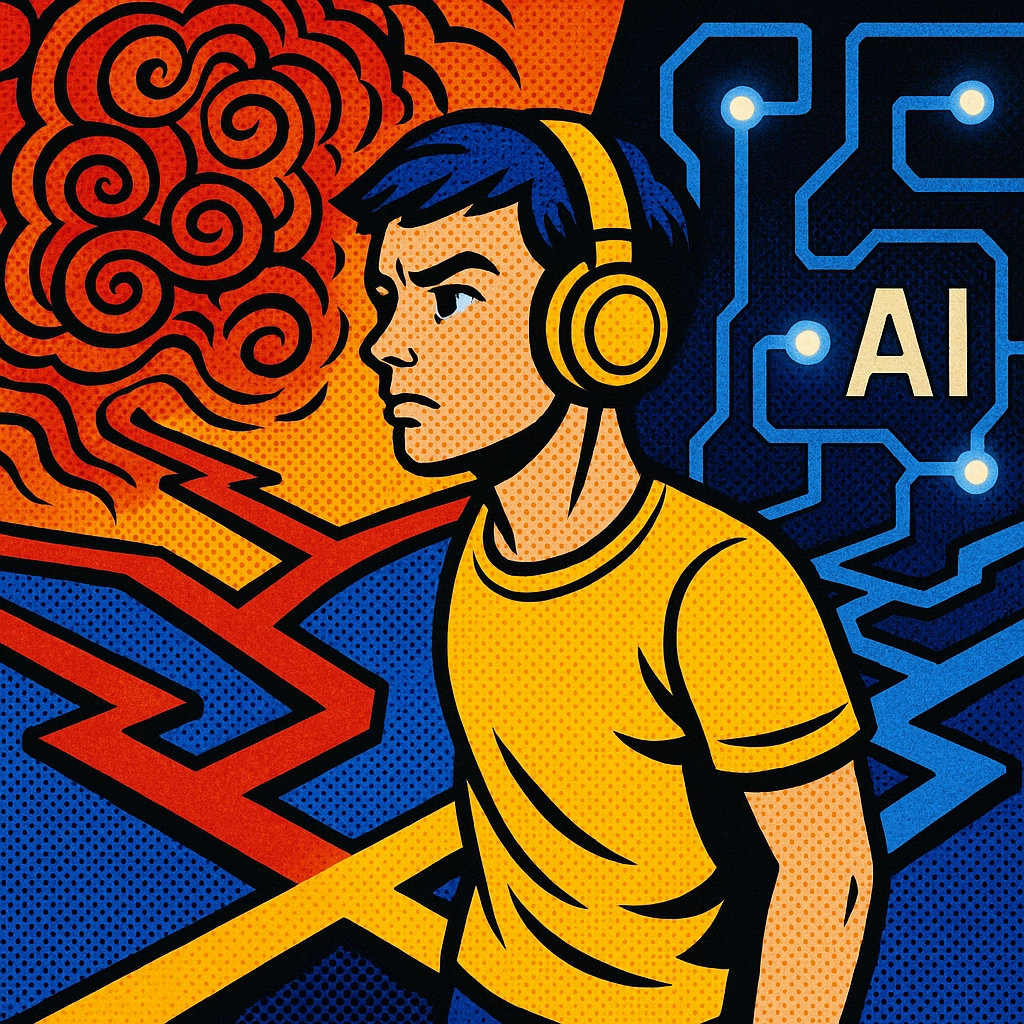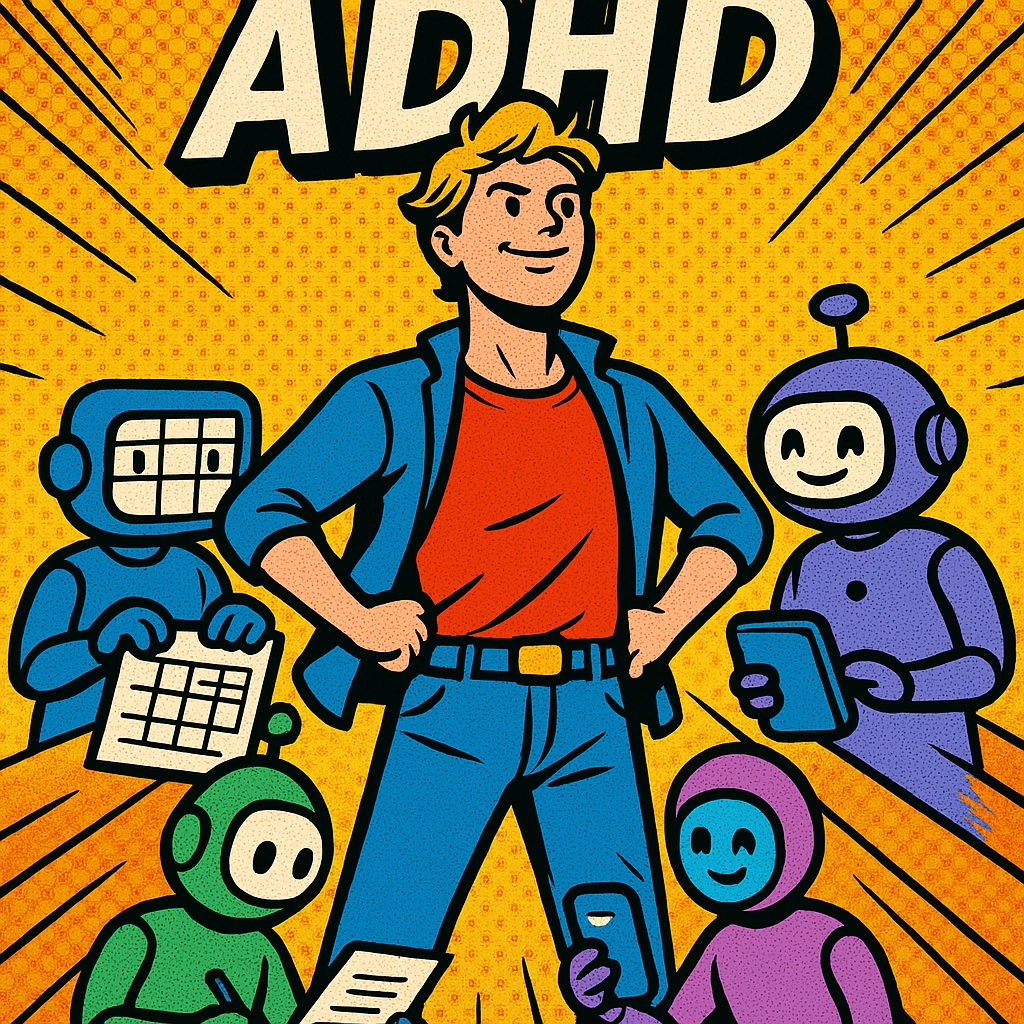Let's be real: managing ADHD can feel like trying to organize a tornado. Your brain is buzzing with brilliant ideas one minute, then completely blank the next. You're either hyperfocused on something fascinating (but probably not what you're supposed to be doing) or struggling to start the simplest task.
"Having ADHD isn't about not knowing what to do—it's about not being able to do what you know."
In our increasingly complex digital landscape, those with ADHD face unique challenges. But here's the good news: the same technological revolution that's added more distractions has also created powerful solutions. Artificial intelligence has emerged as a game-changing ally for those with ADHD—offering personalized, judgment-free support that works with your brain, not against it.
This guide will walk you through the ultimate AI toolkit for ADHD management, helping you transform potential chaos into productivity and peace of mind.
Understanding How AI Addresses Core ADHD Challenges
Before diving into specific tools, let's understand how AI uniquely addresses the fundamental challenges of ADHD:
| ADHD Challenge | How AI Helps | Example Tool Features |
|---|---|---|
| Executive Dysfunction | Breaks down complex tasks into manageable steps | Step-by-step planning assistants |
| Time Blindness | Provides adaptive reminders and time estimation | Smart calendar tools with buffer time |
| Working Memory Issues | Captures and organizes fleeting thoughts | Voice-to-text note-taking apps |
| Difficulty Prioritizing | Applies objective frameworks to sort tasks | Eisenhower Matrix automation |
| Task Initiation Problems | Creates low-friction starting points | Micro-task breakdown with 2-minute rule |
| Maintaining Focus | Implements evidence-based focus techniques | Integrated Pomodoro timers |
The key advantage? Unlike static organizational systems that fall apart when you inevitably deviate from them, AI adapts to your changing needs and patterns.

The Essential AI Toolkit for ADHD Management
1. Task Management & Organization
TickTick: Your ADHD-Friendly Command Center
TickTick has emerged as the gold standard for ADHD task management because it combines:
- Built-in Eisenhower Matrix for urgent/important sorting
- Integrated Pomodoro timer to manage focus sessions
- Calendar view for visual time management
- Daily summaries to track progress
"For ADHD brains, the ideal system isn't just about organizing tasks—it's about reducing the cognitive load of decision-making."
ChatGPT: Your Personal Task Breakdown Assistant
For those moments when you're staring at a big project and don't know where to start, ChatGPT excels at:
- Breaking complex projects into sequenced, bite-sized tasks
- Generating custom checklists for recurring activities
- Providing time estimates based on your specific challenges
- Creating adaptable templates for common workflows
Pro Tip: Try this prompt: "I have ADHD and need to break down [your project] into manageable steps. Include approximate time estimates and note which tasks require full focus vs. which can be done during lower energy periods."
2. Focus & Time Management
Focus Apps with AI Enhancement
□ Forest App: Gamifies focus sessions with tree-growing visualization □ Brain.fm: AI-generated music specifically designed for ADHD focus □ Freedom: Smart blocker that learns your distraction patterns □ RescueTime: AI analysis of your productivity patterns with adaptive recommendations
Time Blindness Solutions
One of the most challenging aspects of ADHD is time perception issues. These AI tools help:
- Calendar.ai: Automatically schedules buffer time between meetings
- TimeBloc: Visual timeline planning with AI time estimation
- Clockwise: Intelligent calendar assistant that protects focus time
3. Memory & Information Management
Notion AI: Your Second Brain
Notion's AI capabilities make it perfect for ADHD information management:
- Auto-organizes notes and information
- Creates summary pages of scattered information
- Transforms messy notes into structured documents
- Generates databases from unstructured information
Otter.ai: Never Miss What Was Said
For those who struggle with auditory processing or note-taking:
- Real-time transcription of meetings and conversations
- AI-generated summaries of key points
- Searchable meeting archives
- Integration with calendar and task systems

Implementing Your AI ADHD System: A Practical Guide
The key to success is not trying to implement everything at once. ADHD often comes with enthusiasm for new systems followed by abandonment when they become overwhelming.
Instead, follow this progressive implementation plan:
Step 1: Start with a Single AI Assistant
Begin with just one AI tool that addresses your most pressing ADHD challenge:
- If task initiation is your biggest hurdle: Start with ChatGPT for task breakdown
- If distraction is your primary issue: Begin with TickTick's Pomodoro + task system
- If information overwhelm is your challenge: Implement Notion AI first
Step 2: Create Your Personal AI Prompt Library
One game-changing strategy is building a collection of effective prompts tailored to your specific ADHD challenges:
Morning Planning Prompt:
I have ADHD and these are my 3 most important tasks today: [list tasks]. Help me break each one down into 5-minute starter steps, estimate realistic timeframes accounting for transitions, and suggest the best order based on energy levels.
Overwhelm Reset Prompt:
I'm feeling overwhelmed with [specific situation]. Help me identify: (1) What absolutely must happen today (2) What can wait (3) What I can delegate or eliminate (4) A simple next action to regain momentum.
Project Planning Prompt:
I need to plan [project] with my ADHD in mind. Create a timeline with built-in buffer time, identify potential hyperfocus opportunities, flag tasks that might trigger procrastination, and suggest accountability structures.
"The right prompt is like having a personalized ADHD coach in your pocket, available exactly when you need guidance most."
Step 3: Implement Strategic AI Automation
Once you're comfortable with basic AI tools, add automation to reduce cognitive load:
- Set up automatic email processing to sort important messages (more on this below)
- Create automated content calendars that send reminders
- Implement AI-driven habit tracking that adapts to your patterns

How Marblism's AI Employees Can Support Your ADHD Management
While the tools above offer tremendous value, there's something powerful about having dedicated AI assistants who learn your specific needs over time. Here's how Marblism's AI employees can be particularly helpful for ADHD management:
Eva: Your Executive Brain Extension
Eva, the AI Executive Assistant at Marblism, functions like an external executive function system:
- Automatically organizes your inbox with custom labels
- Filters out low-value emails that would normally distract you
- Drafts responses to routine messages
- Creates meeting summaries with action items highlighted
This reduces the decision fatigue that so often plagues those with ADHD, freeing mental bandwidth for creative and strategic work.
Penny: From Ideas to Finished Content
For professionals with ADHD who struggle with the blank page or maintaining consistent content schedules, Penny transforms fleeting ideas into structured content:
- Generates topic ideas based on your expertise
- Creates outlines when you're struggling with structure
- Develops drafts that you can refine rather than starting from scratch
- Maintains publishing schedules when consistency is challenging
Stan: Reducing Sales Follow-Up Anxiety
Sales follow-up is notoriously difficult for those with ADHD due to rejection sensitivity and task initiation challenges. Stan helps by:
- Identifying leads that need attention
- Creating personalized follow-up messages
- Setting up reminder systems that won't be ignored
- Maintaining relationship databases so no contact falls through the cracks
Important Considerations and Limitations
While AI tools offer tremendous support for ADHD, they come with important caveats:
□ Not a replacement for professional help: AI tools complement, not replace, therapy, medication, and ADHD coaching □ Privacy considerations: Be mindful about sharing sensitive personal information □ Customization is essential: Generic AI systems need your input to truly address your specific ADHD profile □ Start small: Implementing too many tools at once can create more overwhelm
Getting Started: Your First Week With AI for ADHD
Day 1: Baseline Assessment
- Identify your top 3 ADHD pain points
- Choose one AI tool that directly addresses your biggest challenge
- Set up a simple 15-minute daily check-in with your chosen tool
Days 2-5: Consistent Micro-Implementation
- Use your chosen tool for just one specific task or challenge daily
- Document what works and what doesn't in a simple note
- Adjust settings and approaches based on your experience
Days 6-7: Evaluate and Expand
- Review what worked best during your first week
- Add one additional feature or tool that complements your first success
- Create a sustainable plan for the next 30 days
Final Thoughts: The Future of AI and ADHD
The relationship between AI and ADHD management is just beginning to unfold. As AI systems become more sophisticated in understanding neurodivergent thinking patterns, we can expect increasingly personalized support that works with—not against—the unique strengths and challenges of the ADHD brain.
The ultimate goal isn't to "fix" ADHD but to create systems that reduce unnecessary friction, allowing your creative, innovative thinking to flourish while keeping life's essential tasks on track.
By thoughtfully implementing the right AI tools for your specific ADHD profile, you can create an external support system that adapts to your needs, providing structure when necessary and flexibility when beneficial—all without judgment or rigidity.
Remember: the perfect system isn't one that never fails—it's one that helps you recover quickly when things inevitably go off track. With AI as your partner, that recovery becomes increasingly seamless, allowing you to focus on what truly matters.











